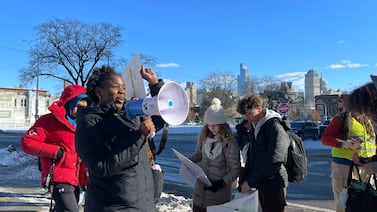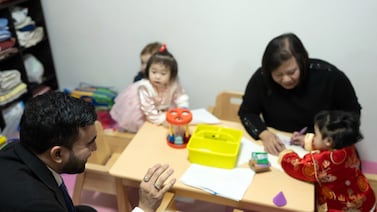Sign up for Chalkbeat New York’s free daily newsletter to keep up with NYC’s public schools.
New York City educators are eagerly awaiting new details on the state’s efforts to reimagine high school graduation requirements, which officials are expected to unveil on Monday.
Many have praised the proposed removal of Regents exams from diploma requirements, but questions remain over what a new system will look like in practice, sparking some fears over potential inequities across the state’s schools and uneven academic standards.
“Everybody has the question of, ‘What are these things going to look like?’” said Kiri Soares, principal of the Urban Assembly Institute of Math and Science for Young Women in Brooklyn. “The one thing I’ll say about the Regents standard is that there is an equity element to them, which is that there’s an expectation that all kids have to meet this bar. And so I get worried sometimes about, ‘What is the replacement of the bar?’”
New York is one of just a handful of states that requires exit exams, though research has found little evidence to show such exams improve student achievement. And the Regents exams, a more than a century-old rite of passage for New York’s high schoolers, have long faced criticism from students and educators who feel it is an insufficient measure of student learning.
Under a looming overhaul outlined in June, students would no longer be required to pass the state’s Regents exams to earn a high school diploma. Instead, the exams would be among a slew of options for demonstrating proficiency in key areas, including project-based assessments, work-based learning experiences, and more.
Though many support giving students more options, questions remain on what the overhaul could mean for individual schools.
“We have consistently said, from the beginning, that this endeavor is about raising the bar for all, not lowering rigor for some,” said JP O’Hare, a spokesperson for the state Education Department. “The plan we will set forth on Monday will be a thoughtful approach with a timeline that allows educators the opportunity to take stock of their programs in order to prepare our students for a lifetime of continuous learning, fulfilling careers, and informed civic engagement.”
Educators worry about unequal rigor and resources
The state’s full plan — which will include the regulatory and fiscal implications of the proposed changes — comes as the latest step in a multi-year process to overhaul graduation requirements.
Last year, a 64-member Blue Ribbon Commission put forward 12 recommendations for updating the state’s high school graduation requirements — including the adoption of a “portrait of a graduate,” comprised of seven key areas for students to demonstrate proficiency: critical thinking, effective communication, cultural and social-emotional competences, innovative problem solving, literacy across content areas, and status as a “global citizen.”
Those recommendations were later synthesized into four proposed actions by state education officials, one of which was to end the requirement that students pass Regents exams.
In many ways, Soares welcomes the state’s efforts to redefine graduation requirements.
“The Regents exams are over 100 years old, and they measure one kind of learning,” she said. “The idea of moving from testing to doing — like having an internship or these other experiences — is so much more powerful.”
Still, she worried that some students could be pushed into pathways perceived as less rigorous, a concern she said was particularly relevant for students who are already underserved. Soares wondered what measures will be put in place to ensure that all students are held to the same expectations and given the support to meet them.
Bobson Wong, a math teacher at Bayside High School who served on the Blue Ribbon Commission, said he’s been pleased to see the state officials be “genuinely receptive” to input from educators and students, noting they’ve spent months soliciting feedback in public forums. But it will be critical that the state develop policies that are “practical enough to work,” he added.
“One issue that has come up over and over in the discussions that we had on the commission, and also in the public forums, is who is going to pay for all of this?” Wong said. “Regents exams are easy to implement. That’s a big reason why we still have them.
“If you all of a sudden say, ‘Okay, we’ll do project-based learning assessments instead,’ then, who’s managing that, and who’s keeping track of all of that, and who’s going to make sure that all students have equitable access?” he asked.
The proposed changes could spark concerns “that schools and districts will be left to their own devices, and will open the floodgates without students having adequate preparation for postsecondary opportunities,” said David Bloomfield, a professor of education, law, and public policy at Brooklyn College and the CUNY Graduate Center.
“I think the Regents long ago lost its value as a guarantor of graduate quality,” he said. “But the challenge all along really has been: How do you fill that vacuum?”
Some NYC schools already use alternative assessments
Some schools in New York already use alternative models for testing student proficiency. For more than two decades, a coalition known as the “performance standards consortium” has received waivers from the state to forgo Regents exams except for English.
The consortium model has attracted fierce support from educators and families. Proponents argue that performance-based assessments can be just as or even more rigorous than exams, while offering a deeper learning experience that better prepares students for higher education and employment.
But the model can take additional resources and buy-in from school communities to implement, requiring more staff and training than a traditional exam, Bloomfield said.
“The consortium model is a very exacting standard, and it’s not clear how districts across the state will be able to implement that particular pathway,” he said. “You have to have a lot of people involved in grading the PBAs [project-based assessments], as well as helping students develop their PBAs.”
Soares, who was excited by the prospect of bringing in aspects of the consortium to her school, said she hopes that the state will provide schools with resources based on existing models.
“I don’t want the onus to be only on the schools to figure out how to do this,” she said. “I would like to be provided with sources and models of things that they have already vetted and approved.”
Steve Lazar, a high school teacher who previously helped found a consortium school in Manhattan, said the added flexibility would allow for meaningful discussions about how to best assess students in school districts across the state. But he wondered whether the same would apply in New York City, worrying the nation’s largest public school system might opt for a top-down approach.
Lazar doesn’t share in concerns that the changes could result in uneven levels of rigor across the state’s schools. He argued that the focus on Regents exams sometimes pushes teachers to emphasize rote memorization instead of challenging students to grapple with evidence and reason through difficult questions.
“I would not consider current graduation requirements rigorous by any stretch of the imagination,” he said.
Julian Shen-Berro is a reporter covering New York City. Contact him at jshen-berro@chalkbeat.org.







